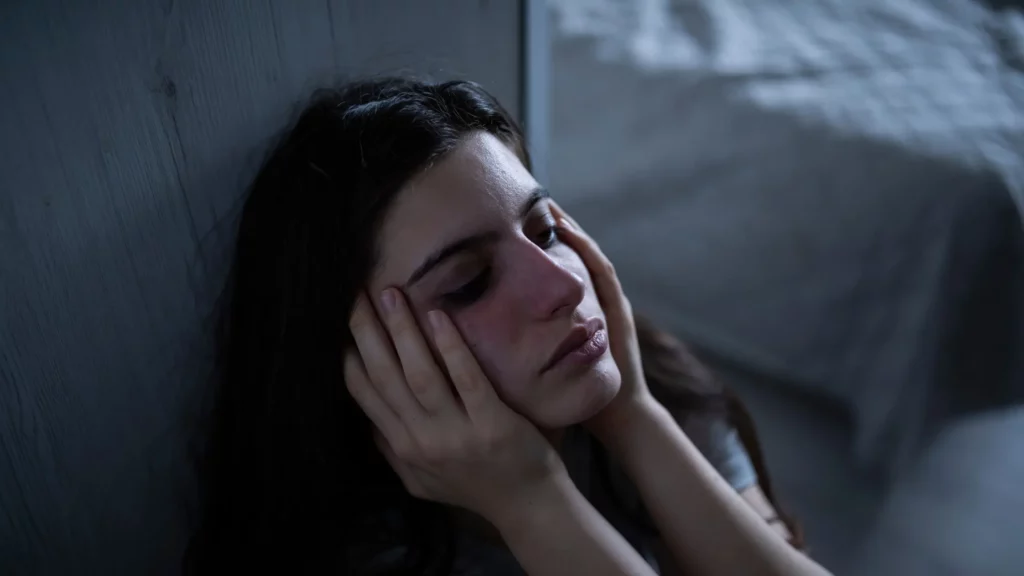As women approach a significant phase of life known as menopause, it’s natural for questions and concerns to arise. One such question often heard is, “How long does menopause anxiety last?” This topic holds great importance because it addresses a common yet often overlooked aspect of menopause – the emotional and psychological impact it can have.
Menopause marks a major hormonal shift, potentially giving rise to anxiety, which can affect daily life. Understanding the duration of menopause anxiety is key for women to navigate this transition with a sense of clarity and preparedness.
Menopause and Anxiety
Menopause is a natural phase in a woman’s life, typically occurring between the ages of 45 and 55. It marks the cessation of menstruation and is a result of hormonal changes within the body.
During this time, the ovaries gradually produce fewer hormones like estrogen and progesterone, leading to the end of reproductive ability.
The Connection between Hormonal Fluctuations and Anxiety
Hormones play a significant role in regulating mood and emotions. As estrogen and progesterone levels fluctuate during menopause, it can impact the brain’s neurotransmitters, affecting mood and potentially triggering anxiety.
These hormonal shifts can cause a variety of physical and emotional symptoms, including hot flashes, night sweats, and feelings of nervousness.
How Long Does Menopause Anxiety Last?
The duration of menopause anxiety is not set in stone; it can differ significantly from one woman to another.
This variation is influenced by multiple factors, including genetics, overall health, and individual hormonal responses.

While some women might experience anxiety for a shorter period, others could contend with it for a longer duration. This diversity underscores the uniqueness of each woman’s experience.
Read Also: How to Treat Menopause Body Odor?
Factors Influencing the Duration of Menopause Anxiety
Several factors come into play when determining how long menopause anxiety persists. The intensity of hormonal fluctuations, pre-existing anxiety tendencies, and personal coping mechanisms all contribute.
Genetics, lifestyle choices, and stress levels also play roles in shaping the duration of anxiety symptoms during menopause.
Typical Timeframe for Menopause Anxiety to Subside
In general, menopause anxiety tends to be most pronounced during the early stages of menopause when hormonal changes are most significant.
As the body adapts to the new hormonal equilibrium, anxiety symptoms often begin to wane.
For many women, the duration of menopause anxiety can range from several months to a couple of years.
It’s important to understand that this timeline is a rough estimate and can vary widely based on individual circumstances.
Seeking Professional Help for Persistent Anxiety
If menopause anxiety lingers beyond what is considered a normal timeframe or significantly interferes with daily life, seeking assistance from healthcare professionals is advisable.
Mental health experts, such as therapists or psychiatrists, can offer guidance tailored to each woman’s needs.
They may suggest therapeutic techniques, lifestyle adjustments, or even medication if necessary to help manage and alleviate anxiety symptoms effectively.

Coping Strategies for Menopause Anxiety
Making adjustments to your daily routine and lifestyle can help manage menopause-related anxiety.
Engaging in regular physical activity, such as walking or yoga, can release endorphins and promote a sense of well-being.
Prioritizing a balanced diet rich in nutrients and minimizing caffeine and alcohol intake can also positively impact mood and anxiety levels.
Psychological Techniques to Reduce Anxiety
Practicing relaxation techniques can be beneficial in alleviating menopause anxiety. Deep breathing exercises, mindfulness, and meditation can help regulate emotions and reduce feelings of anxiousness.
Cognitive behavioral therapy (CBT) is another effective approach, allowing you to challenge negative thought patterns and develop healthier coping mechanisms.
Support Groups and Social Connections
Connecting with others who are experiencing or have gone through menopause can offer valuable emotional support.
Joining support groups, either in person or online, provides a platform to share experiences, exchange coping strategies, and receive empathy from individuals who understand your journey.
Strengthening social connections with friends and loved ones can also provide a sense of belonging and reduce feelings of isolation.
Read More: Menopause and Anger Toward Husbands: All You Need to Know
Consideration of Medical Interventions
In cases where menopause anxiety is particularly severe or persistent, medical interventions may be considered.
Consultation with a healthcare professional is crucial to determine the appropriate course of action.
Depending on the individual’s situation, medications or hormone therapy might be recommended to manage anxiety symptoms.
It’s important to weigh the benefits and potential risks with the guidance of a qualified healthcare provider.
Conclusion
In the realm of menopause, anxiety can cast shadows on an already transformative journey. Recognizing the significance of menopause anxiety duration becomes vital for women traversing this path.
It’s evident that the timeline of menopause anxiety varies, influenced by genetics, hormonal responses, and individual factors.
Acknowledging that duration isn’t uniform underscores the uniqueness of each woman’s experience.
Employing strategies like lifestyle modifications, psychological techniques, support networks, and, when necessary, medical interventions aids in managing menopause anxiety.
The pivotal juncture for seeking professional help lies in identifying when anxiety becomes disruptive or persistent, and healthcare professionals are primed to offer guidance.
By understanding the multifaceted nature of menopause anxiety, women can approach this phase with a more informed perspective, fostering resilience and emotional well-being.
FAQs (Frequently Asked Questions)
1. How does menopause contribute to anxiety?
Menopause triggers hormonal shifts that can affect neurotransmitters in the brain, leading to mood changes, including anxiety.
2. Is menopause anxiety the same for everyone?
No, the duration of menopause anxiety varies widely due to individual factors such as genetics, health, and coping mechanisms.
3. Can lifestyle changes help with menopause anxiety?
Yes, adopting regular exercise, balanced nutrition, and relaxation techniques can positively impact menopause anxiety.
4. What is cognitive behavioral therapy (CBT)?
CBT is a therapeutic approach that helps individuals identify and challenge negative thought patterns, promoting healthier thinking and coping strategies.
5. Is medication an option for managing menopause anxiety?
Yes, in severe cases, healthcare professionals may recommend medication to alleviate anxiety symptoms during menopause.
6. When should I seek professional help for menopause anxiety?
Consider seeking help if anxiety significantly interferes with daily life, disrupts sleep, or becomes overwhelming.
7. Can menopause anxiety be managed without medication?
Yes, many women find relief through therapy, lifestyle changes, and coping strategies without resorting to medication.
8. Is menopause anxiety a temporary phase?
Yes, for most women, menopause anxiety tends to subside as the body adjusts to hormonal changes over time.
9. How can support groups help with menopause anxiety?
Support groups provide a platform to share experiences, learn coping strategies, and receive emotional support from others facing similar challenges.
Medical References:
- Smith, R. L., Gallicchio, L., & Flaws, J. A. (2011). Factors associated with depressive symptoms among women transitioning through menopause: the study of women’s health across the nation. Menopause (New York, NY), 18(11), 1176–1184. PubMed
- Freeman, E. W., Sammel, M. D., & Lin, H. (2006). Associations of hormones and menopausal status with depressed mood in women with no history of depression. Archives of General Psychiatry, 63(4), 375–382. PubMed
- Joffe, H., Soares, C. N., & Cohen, L. S. (2010). Assessment and treatment of hot flushes and menopausal mood disturbances. BMJ (Clinical research ed.), 341, c4257. PubMed







